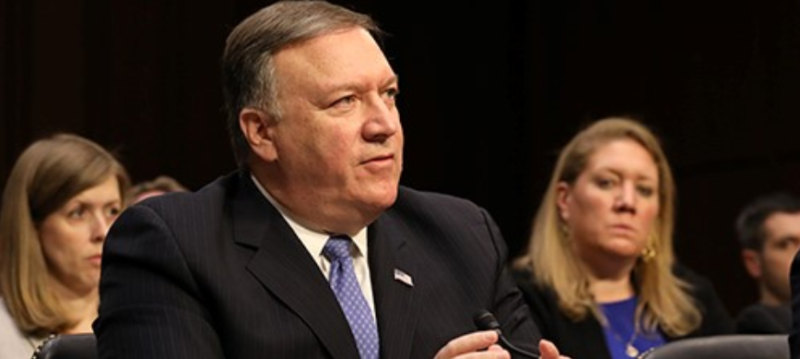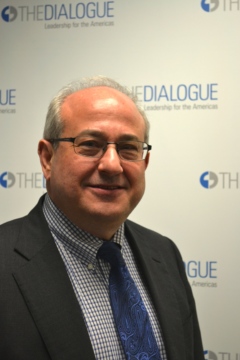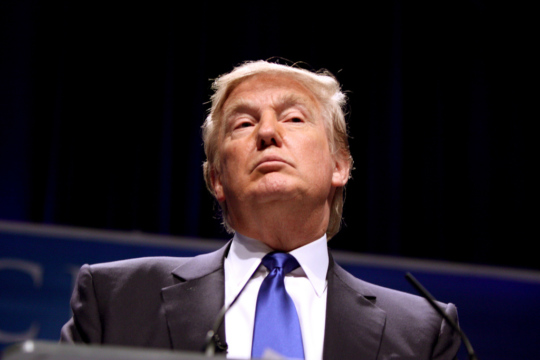
‘Campanha bizarra, cruel e divisiva’, avalia especialista americano
Presidente emérito do Inter-American Dialogue, Peter Hakim diz que maioria republicana sabe que Hillary é provável vencedora.
A Daily Publication of The Dialogue
U.S. President Donald Trump announced his firing of Secretary of State Rex Tillerson on March 13 in a tweet in which he also said that he would nominate current Central Intelligence Agency Director Mike Pompeo for the role. Tillerson’s dismissal came just days after the White House announced that Trump would attend the Summit of the Americas next month in Peru, followed by a stop in Colombia, marking his first trip to Latin America as president. Will Pompeo receive smooth confirmation in the Senate? What does Pompeo’s rise to secretary of state mean for U.S. policy toward Latin America and the Caribbean? What will Trump accomplish on his trip to South America next month?
James R. Jones, member of the Advisor board, chairman of Monarch Global Strategies, former U.S. ambassador to Mexico and former member of the U.S. House of representatives: "Rex Tillerson and Donald Trump are two entirely different personalities, and they never clicked. What was surprising is that Tillerson put up with Trump’s undercutting as long as he did. That air of uncertainty must also have affected his apparent lack of attention to what was going on inside the State Department. Clearly, there was widespread discontent there. Mike Pompeo came to Congress after I left, and I have never had occasion to know him. But he is obviously smart, even if he is much more hawkish than I think is needed at State. What is encouraging is that his record at the CIA indicates that he respects and uses talented career government servants. While many of our best foreign service officers have retired since Trump took office, there are many more who should be included in developing and implementing policy. Pompeo also seems to have the respect of the president and apparently can communicate with him effectively, unlike what Tillerson was able to do. Pompeo should have a fairly smooth confirmation process in the Senate unless he takes a hard-right militaristic view of foreign diplomatic policy. It also should help that he comes from a background of elective politics where one learns that winning votes is best done by finding common ground and mutual respect with those you are trying to influence, not by bullying or lecturing them on how inferior they are. If he can convince Trump to change his approach with the Latin American leaders to emphasize partnership, not paternalism, that could be a major change in how Latin America perceives the United States and how much it is willing to work with us."
Ray Walser, retired U.S. Foreign Service officer and former Latin American policy analyst at the Heritage Foundation: "During his time as CIA director, Mike Pompeo gained the confidence and trust of President Trump like few others, according to Washington pundits. It is therefore hoped that the president, the secretary and the State Department will work in greater harmony. Once the ‘first line of defense,’ diplomacy has suffered a recent death by a thousand cuts. It should be noted, however, that Pompeo would be the first secretary of state since Alexander Haig to graduate from the U.S. Military Academy at West Point, where leadership, professionalism and service are the watchwords of a great institution. Clearly, the new secretary’s most urgent priorities will focus on the gravest geopolitical challenges—North Korean nukes, Chinese and Russian revisionism, Iran, Syria and the post-ISIS Middle East. One assumes Pompeo will not drastically change compass points for the Western Hemisphere and will seek viable partnerships with pivotal nations like Argentina, Brazil, Colombia, Mexico and Peru, increase vigilance for security threats, including terrorism and transnational crime, and implementing effective strategies targeting the vicious circle of crime, corruption and poverty-driven instability in Central America. Undoubtedly Venezuela’s future as a functioning democracy and viable nation-state will loom high on the secretary’s agenda. I rate expectations for President Trump’s summit participation as comparatively low. The president is not popular, and his knowledge of the region is limited and outdated. Following scripted talking points is not his style. A combative ‘America First’ approach to the summit, focused on border walls, economic protectionism and ‘mano dura’ law and immigration enforcement, will float like a lead balloon. To succeed even modestly, it will be incumbent upon the president to offer a positive vision and pathways forward that address shared security and prosperity, strong anti-corruption measures and strengthened democratic institutions. This is a tall order."
Riordan Roett, director of the Latin American Studies program at the Johns Hopkins University’s School of Advanced International Studies: "Trump’s trip to Latin America to attend the Summit of the Americas will follow the less-than-successful visit of Vice President Pence, which followed Trump’s offhand comments regarding military action against the Maduro regime in Venezuela. Regional leaders were not amused. Former Secretary of State Tillerson recently traveled south, issuing dire warnings about the growing role of China in the region, overlooking the dynamic trade relations between most of the countries and Beijing. He also resurrected the Monroe Doctrine. Again, regional leaders were not amused. Trump’s nominee for secretary of state, Mike Pompeo, is a conservative Republican who has been director of the CIA for the first year of the Trump administration. Democrats in the Senate will balk at voting for him, butthe Republicans are in the majority, and he is the president’s choice and will probably be confirmed. Trump carries a great deal of baggage. He canceled U.S. membership in the Trans-Pacific Partnership; he has imposed tariffs on steel and aluminum; his administration has rolled back many of the Obama administration’s decisions on Cuba; and he continues to insist on building a wall along the U.S.-Mexico border. It is difficult to imagine that he will receive little more than a formal, polite reception from his fellow heads of state at the summit. And he deserves little more."
Raymond A. Joseph, former ambassador of Haiti to the United States: "Even before leaving for his trip to Peru to attend the April 13-14 summit, President Trump must rearrange his agenda. As expected, he won’t be meeting with Pedro Pablo Kuczynski, the 79-year-old former Wall Street banker who resigned last week as Peru’s president. Interestingly, the theme of the summit is ‘Democratic Governance Against Corruption.’ Will President Trump meet privately with Peru’s new president, Martín Vizcarra, a longtime ally of Kuczynski? The anti-corruption movement sweeping through the region will be a test for the nominated secretary of state, Mike Pompeo. A former congressman who received Senate confirmation last year as CIA director, he will probably be approved for his new post. He must repair relations with the region, which are frayed after his predecessor evoked the Monroe Doctrine to warn against China’s increasing influence in the region. President Trump’s immigration policy and his previous derogatory comments about Mexicans and Salvadorans don’t endear him to ‘friends’ south of the border. His stiff tariffs on aluminum and steel products specifically harm the economy of Brazil. Though Colombian President Juan Manuel Santos was invited to the White House last month, President Trump still plans a stop in that country, no doubt to bolster Colombia’s resolve against Venezuela, a political and economic headache for the region."
The Latin America Advisor features Q&A from leaders in politics, economics, and finance every business day. It is available to members of the Dialogue's Corporate Program and others by subscription.
Presidente emérito do Inter-American Dialogue, Peter Hakim diz que maioria republicana sabe que Hillary é provável vencedora.
Michael Shifter fue entrevistado por Gerardo Torres de El Salvador sobre los temas más destacados en la agenda regional. Entre otros asuntos, Shifter habló sobre el futuro de la paz en Colombia, la crisis política y económica en Venezuela, y el impacto de las elecciones de Estados Unidos en la región.
¿Debe México hacer campaña en Estados Unidos para que conciudadanos se registren y voten, y otra para resaltar los beneficios del TLCAN? ¿Es momento de pensar en cómo recibiremos a millones de deportados, hay que dar la pelea en tribunales internacionales de derechos humanos? ¿Llegó la hora de preparar represalias comerciales contra Estados Unidos y considerar nuevos socios en AL, Europa y Asia? Son muchas preguntas, y variadas y hasta opuestas las respuestas que dan diplomáticos, politólogos y analistas. Sólo una sola cosa es cierta: Trump es impredecible.
 Mike Pompeo is U.S. President Donald Trump's pick for secretary of state.
Mike Pompeo is U.S. President Donald Trump's pick for secretary of state.

